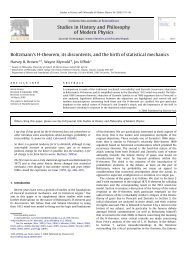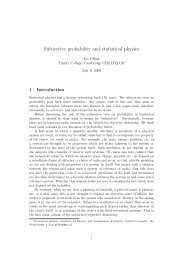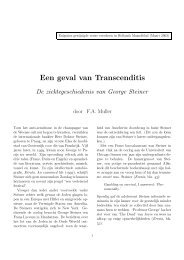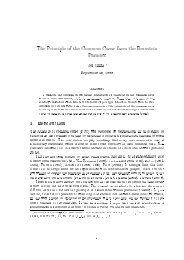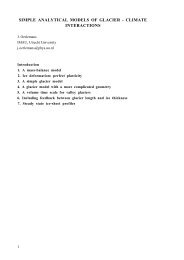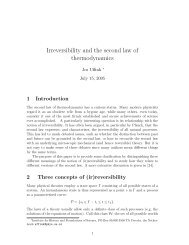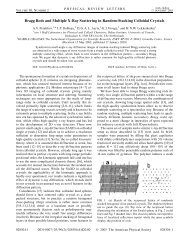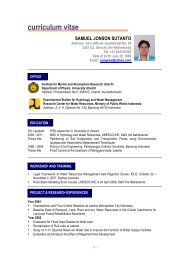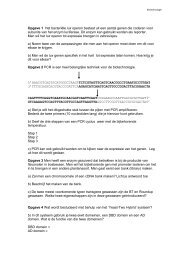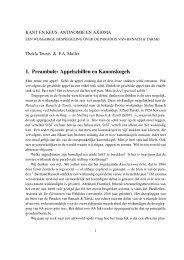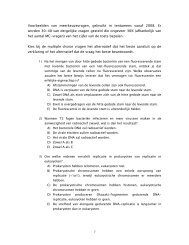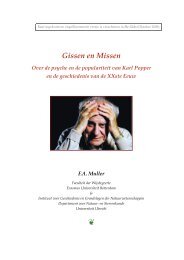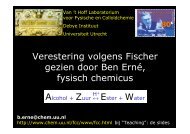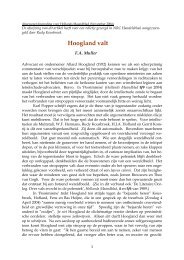FOUNDATIONS OF QUANTUM MECHANICS
FOUNDATIONS OF QUANTUM MECHANICS
FOUNDATIONS OF QUANTUM MECHANICS
You also want an ePaper? Increase the reach of your titles
YUMPU automatically turns print PDFs into web optimized ePapers that Google loves.
I. 2. INCOMPLETENESS AND LOCALITY 11<br />
the microscopic to the macroscopic level. Then there is the question what an observation exactly is.<br />
Are cats observers of their own situation? And if consciousness is essential for an observation, do<br />
cats have the correct type of consciousness?<br />
From the examples above we can isolate the following central concepts:<br />
1. the real state of a system independent of measurement,<br />
2. incompleteness,<br />
3. measurement disturbance,<br />
4. complementarity,<br />
5. the transition from microscopic to macroscopic,<br />
6. consciousness. 1<br />
I. 2 INCOMPLETENESS AND LOCALITY<br />
The previous discussion only served to get the reader in the right mood! In 1935 Albert Einstein,<br />
Boris Podolsky and Nathan Rosen, from now on abbreviated as EPR, came up with an example<br />
which considerably sharpened the discussion (EPR 1935). Using rigorous reasoning they argued that<br />
quantum mechanics is an incomplete theory. As an introduction to their argumentation we will first<br />
examine a more simple argument that Einstein formulated in the same year in a letter to Schrödinger,<br />
as paraphrased by A. Fine (1986, p. 37).<br />
Consider a composite system of two particles which interacted with each other but are so widely<br />
separated in space now that they no longer interact. Suppose they are in a state |ψ⟩ which is an eigenstate<br />
of the total momentum P 1 +P 2 with eigenvalue 0, but is not an eigenstate of P 1 or P 2 separately,<br />
(P 1 + P 2 ) |ψ⟩ = 0 and P 1 |ψ⟩ ̸= a |ψ⟩, P 2 |ψ⟩ ̸= b |ψ⟩, for a, b ∈ R. (I. 1)<br />
Through a measurement of the momentum of particle 1 we can predict with certainty what the result<br />
will be of a measurement of the momentum of particle 2. Moreover, the measurement of particle 1<br />
has absolutely no physical influence on particle 2. But if it is possible to predict the momentum of<br />
particle 2 with certainty without any interaction with that particle, then particle 2 must already have<br />
this momentum before the measurement, and this must even be the case before the measurement of<br />
particle 1, since the measurement absolutely does not disturb particle 2. However, the value of this<br />
property of particle 2 cannot be derived from the quantum mechanical description using the state |ψ⟩.<br />
Therefore, quantum mechanics is incomplete.<br />
We see how Einstein succeeds, thanks to the strict correlation between the particles that quantum<br />
mechanics allows for, and thanks to the spatial separation of the particles, to refute the argument of<br />
1 The role of consciousness is regarded as essential by mathematicians and physicists like Von Neumann, London,<br />
Heitler and Wigner. The fact that they felt forced to take this highly unusual step in physical theory illustrates how serious<br />
the situation is.



